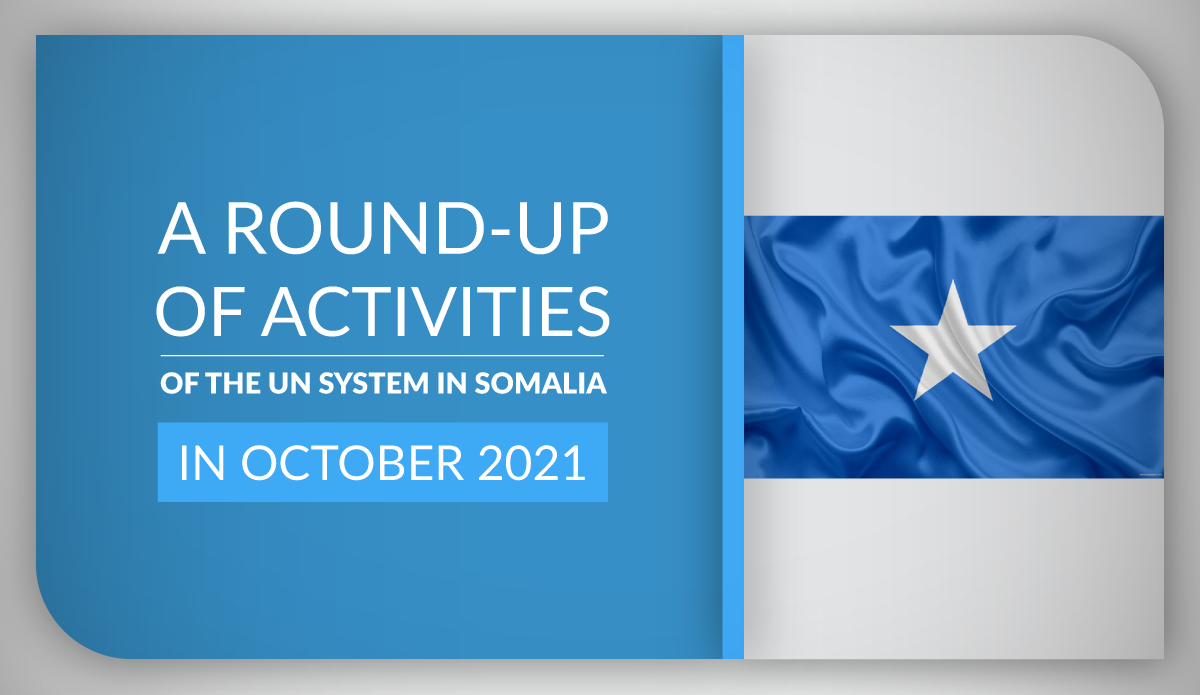A round-up of activities of the UN system in Somalia in October 2021
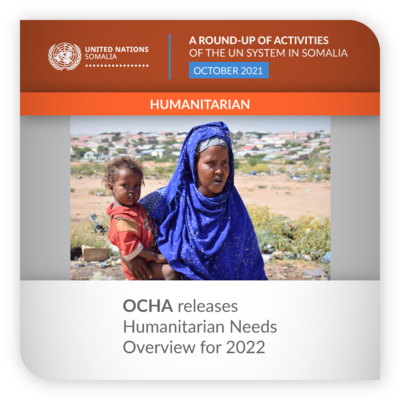 |
Humanitarian | OCHA releases Humanitarian Needs Overview for 2022 OCHA released the consolidated Humanitarian Needs Overview for 2022, which estimates that a total of 7.7 million Somalis will need humanitarian assistance in 2022, including 2.2 million internally displaced people (IDPs). OCHA notes that IDPs are chronically more food insecure and vulnerable than host communities. Displacements are typically rural-urban in nature, with displaced people moving into urban centres often lacking the skills required for urban livelihoods, and IDPs and rural migrants frequently confined to poor-paying unskilled jobs, if any at all. Furthermore, the majority of the IDPs have no official documentation for the mostly privately-owned land on which they reside, exposing them to repeated evictions. |
|
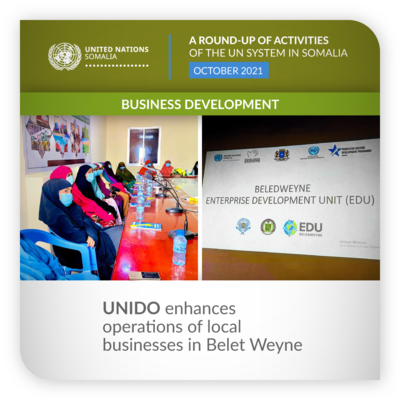 |
Business Development | UNIDO enhances operations of local businesses in Belet Wweyne The Enterprise Development Unit (EDU) in Belet Weyne – established via the UNIDO-backed Productive Sectors Development Joint Programme for Somalia – provided training and counselling services to 65 potential or existing local entrepreneurs on how to improve and expand their business operations. Along with UNDP, UNIDO also provided a credit facility to complement the training with access to finance, disbursing a total of $187,000 in loans of between $5,000 - $15,000 each, to 19 of the entrepreneurs. Among the 19 was Hassan Mohamed of Kaah Agro Company, who managed to reduce its operating costs by 55 per cent and increase productivity from the firm’s farmland by incorporating enterprise management principles and investing in a cost-effective energy source through the implementation of a solar-powered pump irrigation system. |
|
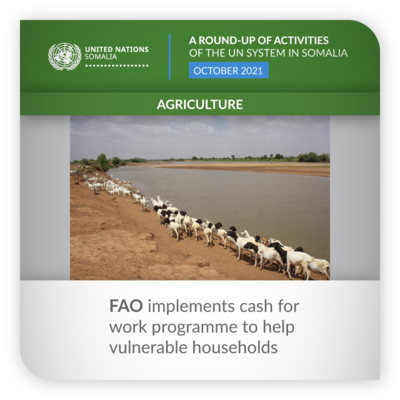 |
Agriculture | FAO implements cash for work programme to help vulnerable households Through the US Agency for International Development (USAID)-funded project, ‘Improving and sustaining food security in rural Somalia,’ FAO implemented cash for work (CFW) and unconditional cash transfers (UCTs) schemes to help Somalis working in agriculture cope with livelihood-affecting shocks such as drought. The two schemes – CFW and UCTs – enable vulnerable people to receive short-term cash transfers to meet their most immediate needs while supporting the rehabilitation of community-owned, productive assets that help them to recover, or remain more food secure in the next drought. CFW aims to assist families who are economically vulnerable but able to work, supporting the rehabilitation of productive assets that provide vital resources such as water for productive use. UCTs are designed to support the most vulnerable families who are unable to work. https://www.fao.org/emergencies/fao-in-action/stories/stories-detail/en/c/1445377 |
|
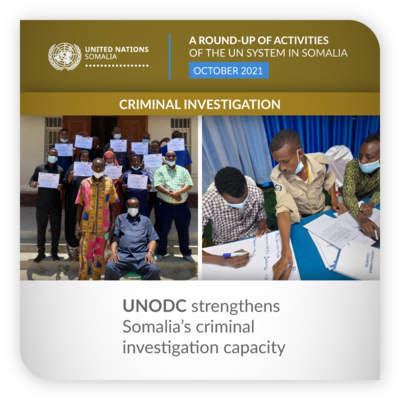 |
Criminal Investigation | UNODC strengthens Somalia’s criminal investigation capacity Through the UNODC Criminal Investigation Program (CIP) in Somalia, funded by the US State Department, UNODC supports the Somali Police Force with criminal investigation capacity at both the federal state levels. As part of CIP, UNODC has developed the ‘Investigator Development Pathway.’ In October, 27 officers – including two female officers – graduated from the first course, known as the Investigator Development Course 1 (IDC1). As part of IDC1, participants learn crime scene management, exhibit packaging, fingerprint collection and interview skills. Via CIP, UNODC is rolling out IDC1 across Somalia with the aim of training 65 federal officers in Mogadishu, and 65 in Jubaland, Galmudug, South West State and Hirshabelle, as well as another 69 officers in Puntland. https://twitter.com/UNODC_EA/status/1452981871655194637 |
|
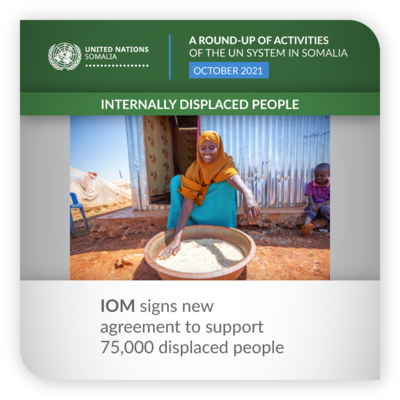 |
Internally displaced people | IOM signs new agreement to support 75,000 displaced people IOM signed a four-year, multi-million dollar project – named ‘Saameynta’ (Somali translation: ‘impact’) – to support the Federal Government of Somalia to find durable solutions for more than 75,000 internally displaced people (IDPs) and vulnerable host community members, out of Somalia’s total caseload of 2.9 million IDPs. Through enhancing the sustainable reintegration of displaced communities in urban areas, Saameynta aims to leverage value generated by planned urbanization and urban infrastructure investment and to increase the self-reliance and access to sustainable basic services of IDPs residing in the cities of Baidoa, Bossaso and Belet Weyne. The project, led by IOM in coordination with UNDP and UN-Habitat, comes at a crucial time as forced displacement, drought and the impact of the COVID-19 pandemic have further exacerbated the displacement situation. |
|
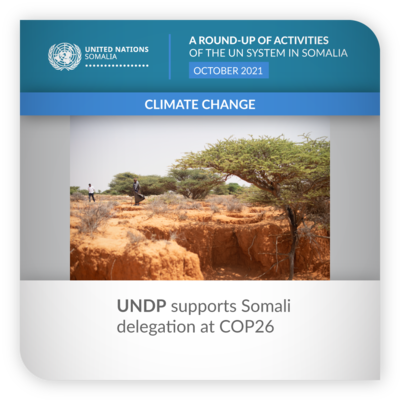 |
Climate change | UNDP supports Somali delegation at COP26 For nearly three decades, the UN has been bringing together almost every country on earth for global climate summits – called COPs, which stands for ‘Conference of the Parties.’ In that time, climate change has gone from being a fringe issue to a global priority, and this year’s will be the 26th annual summit, taking place in Glasgow, in the United Kingdom. UNDP is supporting the participation of Somalia’s delegation to the 2021 UN Climate Change Conference (COP26). Somalia is one of the world’s most vulnerable countries for climate change, and the delegation will help advocate on behalf of Least Developed Countries and also showcase its nationally determined contribution, developed with support from UNDP’s Climate Promise programme. |
|
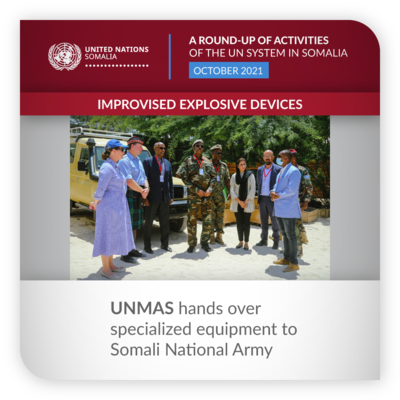 |
Improvised Explosive Devices | UNMAS hands over specialized equipment to Somali National Army In the presence of senior UN and UK officials, UNMAS handed over specialized equipment to the Somali National Army as part of the latter’s counter-improvised-explosive-device (IED) capacity development process, in line with the Somalia Transition Plan, which is a comprehensive guide developed by the Federal Government of Somalia and its partners to handover security responsibility to Somali forces from AMISOM peacekeepers. The handover of the specialized equipment will contribute to strengthening the Somali National Army’s IED threat mitigation capacity and foster a safer Somalia. |
|
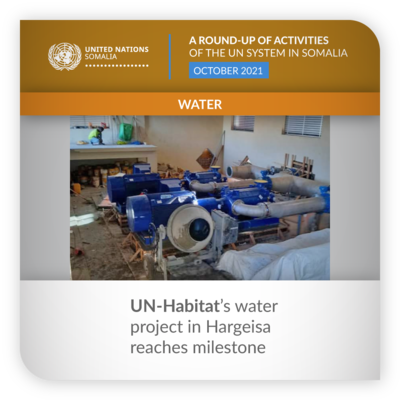 |
Water | UN-Habitat’s water project in Hargeisa reaches milestone UN-Habitat’s support for the Hargeisa Urban Water Supply Upgrading Project marked an important milestone with the recent delivery of two new high-pressure pumps and stainless steel pipes needed to bring the project to completion. Over the coming five months, the installation and connection of the pumps, generators, fuel systems, surge vessels, stainless steel pipework, fire and lightning protection systems, control panel and electrical wiring will be ongoing at the new Ged Deeble Pumping Station, as part of the project. With a projected handover date in March 2022, the water infrastructure upgrading project will increase the amount of water available for Hargeisa from the current output of nine million to a projected 14.5 million litres per day, with the potential capacity to expand production to 24 million litres per day in the near future. https://twitter.com/UNHabitat_Som/status/1453670770056511494 |
|
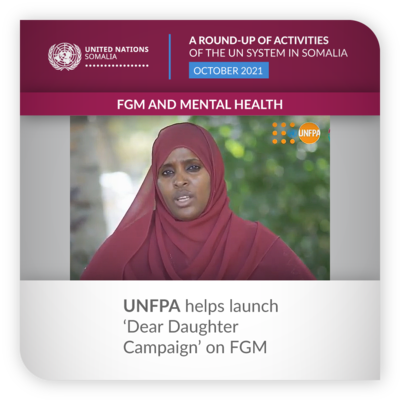 |
FGM and mental health | UNFPA helps launch ‘Dear Daughter Campaign’ on FGM To mark World Mental Health Day on 10 October, UNFPA and Ifrah Ahmed, a campaigner against female genital mutilation (FGM) and founder of the Ifrah Foundation, shared a reminder that FGM often results in psychological problems. They jointly launched the ‘Dear Daughter Campaign,’ through which people can pledge to not cut their daughters, and thereby also protect the mental health of women and girls. https://somalia.unfpa.org/en/news/world-mental-health-day-ifrah-ahmed-calls-ending-fgm |
|
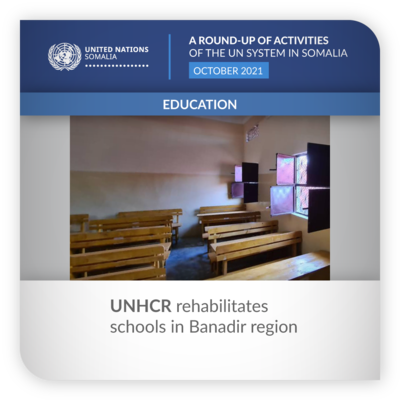 |
Education | UNHCR rehabilitates schools in Mogadishu and Banadir In October, UNHCR – through its implementing partner Mercy Corps – provided educational support by rehabilitating eight classrooms and furnishing them with 45 sets of desks at thef Rage Ugas school in Mogadishu. Meanwhile, construction of two other classrooms is ongoing in Qansaxlaey primary school in Dollow and will be completed in the coming weeks. UNHCR continues to equip schools across Somalia to ensure that vulnerable students attending have access to protective and dynamic school environments that are conducive to quality teaching and learning. The UN refugee agency believes that quality education remains a key goal to improve the learning environment for the displaced communities. |
|
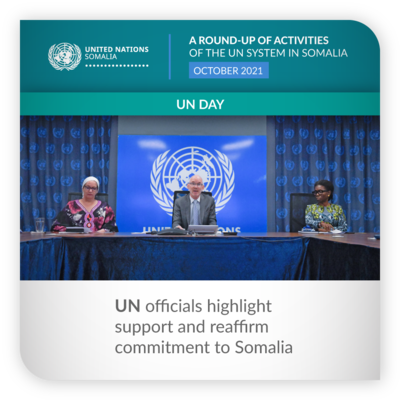 |
UN Day | UN officials highlight support and reaffirm commitment to Somalia Marking this year’s United Nations Day, observed on 24 October, the world body’s top officials in Somalia flagged some of the support being provided to and challenges faced in assisting Somalis on their path to peace and stability, while also re-affirming their commitment in line with the organization’s founding principles. “The United Nations was created as a vehicle of hope for a world emerging from conflict. And now, 76 years later, it continues to serve the peoples of the world. Some of the challenges it was created to address have not changed, unfortunately: conflict, poverty, hunger. At the same time, new challenges have arisen: COVID-19 and climate change, to name just two examples,” the UN Secretary-General’s Special Representative for Somalia, James Swan, said at a virtual press conference in Mogadishu, alongside other senior UN officials. “Here in Somalia,” he continued, “the United Nations has been a steadfast partner of the country since its independence, dating back decades, and we expect the partnership with Somalia to continue across a wide range of areas in the future.” |
|
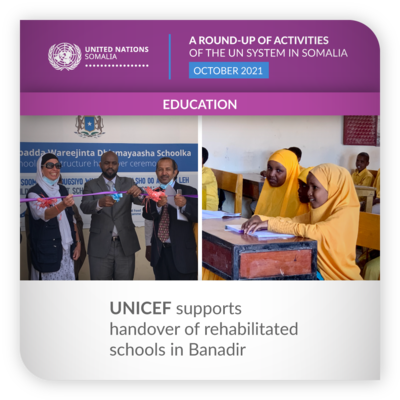 |
Education | UNICEF supports handover of rehabilitated schools in Banadir Children spend a significant part of their day at school, where the lack of services can impact their learning, health, and dignity – especially girls. With this concern in mind, UNICEF completed the rehabilitation of nine public schools in the Banadir region and handed them over to the authorities. The rehabilitation included the construction and/or refurbishment of classrooms, water and sanitation facilities, and garbage collection systems. Some schools received desks while others had repairs carried out on boundary walls, gates, playgrounds, staff offices and toilets. The project is part of a Germany-funded, joint UNICEF-WFP programme to improve resilience among marginalized communities in the Banadir region and Jubaland. The programme has just been extended and now includes FAO’s support for livelihoods. https://twitter.com/unicefsomalia/status/1442055570647814147 |
|
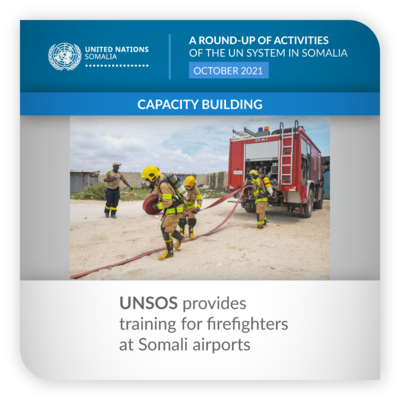 |
Building capacity | UNSOS provides training for firefighters at Somali airports UNSOS commenced a two-month training programme on aviation and rescue firefighting for 16 Somali and AMISOM firefighters. The specialized training covers fire dynamics, first aid, extinguishing techniques, vehicle and vessel equipment handling, airfield layout and aircraft construction, operational tactics, emergency communication and physical fitness. UNSOS has been offering firefighting training to develop local capacity to respond to fire emergencies at airports around Somalia. This fifth cohort of trainees includes trainees and serving firefighters from Somalia’s regional airports and members of the Somali National Army. https://unsos.unmissions.org/unsos-trains-amisom-sna-civilian-firefighters |
|
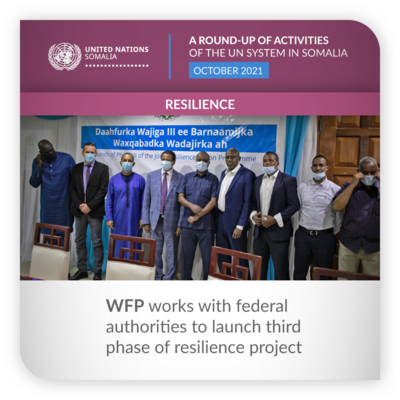 |
Resilience | WFP works with federal authorities to launch third phase of resilience project Along with FAO and UNICEF, WFP joined the Federal Government in launching the third phase of a project to strengthen the resilience of 25,000 households in Jubaland. Government-owned, jointly managed by the three UN agencies, and funded by Germany, the project will improve access to education, health, hygiene and nutrition for children and adolescents, and enhance food security for disadvantaged households. It builds on gains made by UNICEF and WFP in the first two phases, which included refurbishments and hot meals in dozens of schools and improved nutrition indicators. The phases are integrated so the work of all the UN agencies is mutually reinforcing. For example, UNICEF and WFP will continue to support nutrition and education interventions, while FAO enrols households with malnourished or vulnerable children into livelihoods activities – empowering them to improve their own food and nutrition security. |
|
 UN
UN
